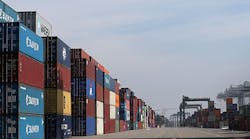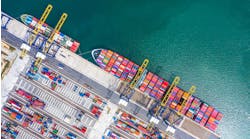With the holiday shopping season officially under way, imports at the nation’s major retail container ports are expected to be up 4.4% this month over the same time last year and should see a slightly larger increase next month, according to a Global Port Tracker report from the National Retail Federation and Hackett Associates.
“Retailers are importing more during the holidays this year than last year and that can only mean one thing—they expect to sell more,” says Jonathan Gold, NRF’s vice president for supply chain and customs policy. “Most of the holiday merchandise is already here, but retailers are still restocking to be sure shoppers will have a broad and deep selection as they hit the stores over the next several weeks.”
Ports covered by Global Port Tracker handled 1.6 million twenty-foot equivalent units (TEUs) in September, the latest month for which after-the-fact numbers are available. That was down 6.6% from August, the busiest month of the year, and down 1.6% from September 2015. One TEU is one 20-foot-long cargo container or its equivalent.
Volume rebounded in October to an estimated 1.67 million TEUs, up 7.5% from last year. November is forecast at 1.54 million TEUs, up 4.4% from last year, and December at 1.5 million TEUs, up 4.5%.
The numbers come as NRF is forecasting $655 billion in holiday sales, a 3.6% increase over last year. Cargo volume does not correlate directly to sales because only the number of containers is counted, not the value of the cargo inside. But it nonetheless serves as a barometer of retailers’ expectations.
Cargo volume for 2016 is expected to total 18.6 million TEUs, up 2.2% from last year. Total volume for 2015 was 18.2 million TEUs, up 5.4% from 2014. The first half of 2016 totaled 9 million TEUs, up 1.6% from the same period in 2015.
January 2017 is forecast at 1.54 million TEUs, up 3.6% from January 2016; February at 1.49 million TEUs, down 3.2% from last year, and March at 1.38 million TEUs, up 4.6% from last year.
Hackett Associates founder Ben Hackett says U.S. imports are growing, but not as fast as in past years. “Despite all the good economic news recently, we are faced with imports growing only about 2% this year,” Hackett says. “Whether that is merely part of the aftermath of the Hanjin bankruptcy or a sign of weakening demand is not yet clear. Unless there is a major disruption, however, growth should be modest but sustained during the first half of 2017.”
Global Port Tracker covers the U.S. ports of Los Angeles/Long Beach, Oakland, Seattle and Tacoma on the West Coast; New York/New Jersey, Hampton Roads, Charleston, Savannah, Port Everglades and Miami on the East Coast, and Houston on the Gulf Coast.



